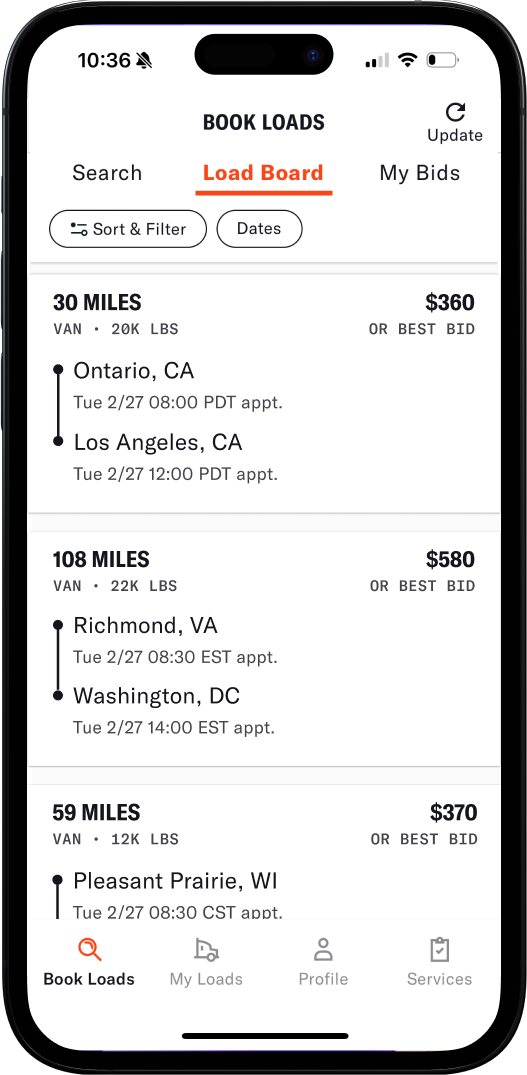Flexport Brings Convoy Trucking Marketplace Back to Life

Flexport has relaunched Convoy’s truckload freight booking marketplace, months after acquiring the technology stack of the defunct digital trucking brokerage.
With the resurrection of the Convoy platform, Flexport now can offer shippers access to its full truckload (FTL) marketplace of small carriers and owner operators. There are more than 400,000 truck drivers and 80,000 carriers in the Convoy network, CEO Ryan Petersen said when the acquisition announcement was made Nov. 1.
More from Sourcing Journal
Current Flexport customers have access to the app, as well as legacy Convoy shippers, according to Bill Driegert, executive vice president and head of trucking at Flexport.
Driegert jumped ship from Uber Freight to Flexport last May to help the company further flesh out its trucking operations. While Driegert said the freight forwarder moved a significant volume of drayage, less-than-truckload (LTL) and FTL capabilities prior to coming on board, he said that the level of investment didn’t always match the scale of the opportunity the trucking sector provided.
“There was clearly an opportunity to up-level that investment, and that’s where this Convoy acquisition really accelerates that,” Driegert told Sourcing Journal. “When I came on initially, that early mandate was ‘How do we build out this type of capability?’ It’s very opportune that this all came together, and that we had this opportunity to really accelerate with the Convoy technology. But that core vision of delivering better trucking capability has been pretty consistent since I came on board.”
Convoy’s app automates the pairing of shipments with carriers—effectively saving money for shippers, while reducing the legwork and hassle for carriers in finding loads to transport. Driegert argued that the introduction of apps like these gives smaller carriers and individual trucking owner-operators better access to freight that they didn’t have in the past.
“The experience for an owner-operator is very different today than it was 10 years ago, largely because of Convoy and others that have brought new capabilities to the market,” said Driegert. “Ten years ago, if I wanted to find a load, it was often a very manual process of solicitation and calling brokers. Owner-operators were very unlikely to get freight from large shippers. They didn’t have access to that because they were working through a broker.”
Driegert said this ecosystem began to change as more truck drivers and small carriers became app-centric, conducting most business via their phone.
Convoy enables carriers to find and book loads from vetted freight brokers and shippers. Carriers will have 24/7 access to the load board in the Convoy app, where they can book loads at the listed rate or have the option to bid.

The integration between the two long-term partners appears to assist smaller trucking companies on the surface, with Driegert noting that large carriers usually have dispatchers making booking decisions instead of individual drivers and usually operate on their own technology stacks.
“It’s less about the size of the carrier than whether or not that driver has autonomy and the driver can use the app,” Driegert said. “At the driver level, I can download the app, I can book a load and I have the authority to do that. So that usually caps out in your five-to-10 truck operations, but there are very large owner-operator-driven organizations where the drivers and the owner-operators within those orgs, they’ll have autonomy to make those decisions for which works the app works very well.”
Within the app, carriers can request detention and cargo unloading fees, track their fleet and manage their load paperwork.
And with the integration, the Convoy platform will be made available to all freight brokers in Q2. Brokers will have access to trucking capacity backed by fraud detection technology and ongoing automated predictive performance scoring and quality control.
As far as the fallout from Convoy’s shuttering of operations in October goes, some of the former company’s 500 employees found a home working at Flexport to help with the relaunch.
Upon acquiring the Convoy tech stack and intellectual property in November, Flexport hired an undetermined amount of former Convoy employees, Driegert confirmed, starting with members of the product and engineering team. When the tech was brought back online, Flexport then hired some ex-Convoy commercial and operations team members.
While the relaunch is a go within the Flexport platform, Driegert and his team sought to make the experience as familiar as possible, without focusing on adding new features to the app just yet.
“We’re very much taking the Convoy platform, bringing it down to the core of where the most value is, getting the marketplace back up and getting the owner-operator capability back up,” Driegert said. “We’re really focusing on the core value proposition, and then we’ll be expanding out there.”
However, he highlighted the “immediate uplift” for Flexport shippers, in that they gain new benefits from the pricing and load tracking capabilities built out initially by the Convoy team.

